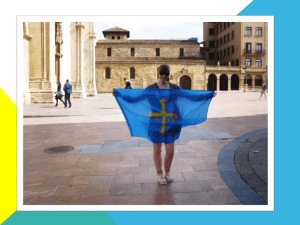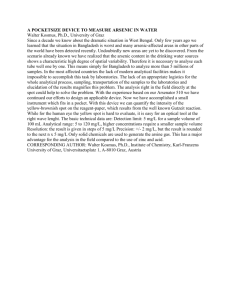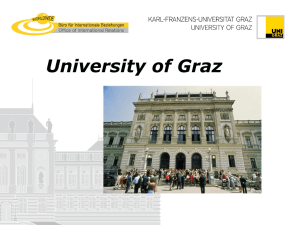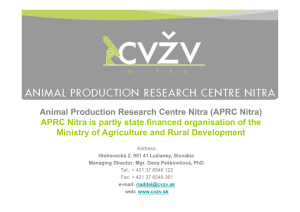Multicultural Education for European Citizenship 2006 –
advertisement
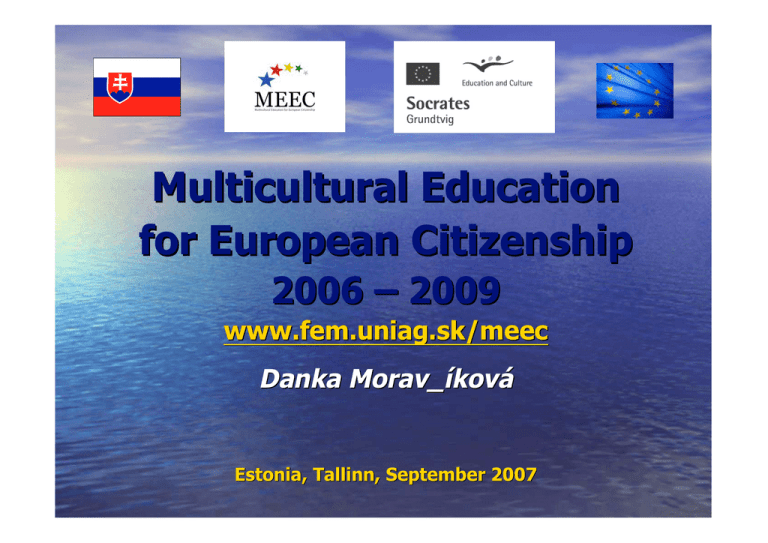
Multicultural Education for European Citizenship 2006 – 2009 www.fem.uniag.sk/meec Danka Morav_íková Estonia, Tallinn, September 2007 Contact seminar in Tallinn June 2006 Why? (Our) presumptions and questions EU=Europe of regions – with different cultures, religions, languages, social behaviour, relationships and practices, different values, opinions and points of view etc. Is Europe only an economic confederacy or is it something more (society knitted by common cultural heritage, values and identity of its inhabitants) ? The cultural differences influence also bussiness culture, consumer behaviour and managerial practices in the country. Why? (Our) presumptions and questions What does it mean (especially for young people) to be an European ? The newest approach to the citizenship term enforces the idea of a duty. We are not born as citizens - we become citizens during our life. How to learn it and what are we able to do? Citizenship is not determined only by legal acts but also by individual abilities to mobilize personal sources and possibilities. How to initiate them ? The aims of the project are: • to bring together experiences about European • • citizenship from the perspective of different European areas to increase awareness of the benefits and consequences of the European integration in the target groups promote the understanding and tolerance among European nations through the teaching and learning of languages, cultures, history, traditions, customer behaviour and interpersonal communication Project Promoter FEM SAU - Faculty of Economics and Management, Slovak Agricultural University, Nitra (SK) Project Partners – FH Joanneum GmBH, Graz (AT) – Szent István University, Gödöllö (HU) – University of Oviedo (ES) – South Bohemian University, _eské Bud_jovice (CZ) Target groups • Young adults (18 – 26) • Local communities (middle age and all age groups) • Adult learners Main activities (done and planned) Project meetings which included: • working discussions to organize effectively all project activities • information day for local community or learners • cultural and social program to provide so called “cultural education” for project meeting participants. Main activities (done and planned) Survey on knowledge and opinion level on issue of the European citizenship: • the questionnaires has been developed in English and then translated to the national languages ..\..\Dotazníky\Improved final questionnaire.doc • 210 respondents in each participating country (of age 18 – 21,) • in total we gathered the questionnaires from 1050 respondents • In present we evaluate the research results in small working teams and try to prepare the papers for experts and public. Main activities (done and planned) Educational activities and knowledge dissemination: Local level: • information meetings with local autonomy and people • education of young people, teachers, employee’s education National level: • days of opened doors at the universities • national seminars (Slovakia) • printed materials (forthcoming) International level: • website in English • Information days in Spain and Hungary (organized by participants of project seminars) • international conferences and workshops (Poland, Austria, Hungary, Estonia, Portugal) • promotion material. The project leads to… • Recommendations how to deal with European Citizenship • Dissemination of project results • Development of Lectures for existing and new curricula • Positioning of participating institutions in terms of competence in this field. Structural differences among respondents Where do you live now? 100% city (more than 100 000) 80% 60% town 40% rural settlement (less than 10 000) 20% 0% Gˆdˆll? Nitra Oviedo Graz Structural differences among respondents How many countries have you visited since the age of 16? 100% 1180% 9-10 7-8 60% 5-6 3-4 40% 1-2 20% 0 0% Gˆdˆll? Nitra Oviedo Graz General attitudes and feelings about EU What does Europe mean to you? - Oviedo 58% CEP 27% values, tradition 69% geo location 68% EURO currency 70% membership in EU 70% 0% 11% 24% 23% 21% 19% 50% very strong, strong (4, 3) 6% 8% 9% 10% 100% middle (2) low (1, 0) General attitudes and feelings about EU What does Europe mean to you? - Graz 61% CEP 24% 11% 72% values, tradition 19% 67% geo location 22% 74% EURO currency 16% 67% membership in EU 0% 20% 50% very strong, strong (4, 3) 6% 8% 8% 10% 100% middle (2) low (1, 0) General attitudes and feelings about EU What does Europe mean to you? - Nitra 69% CEP 23% 75% values, tradition 20% 58% geo location 21% 72% membership in EU 0% 22% 50% very strong, strong (4, 3) 4% 10% 31% 70% EURO currency 7% 9% 6% 100% middle (2) low (1, 0) General attitudes and feelings about EU What does Europe mean to you? - Gˆdˆll? 53% CEP 28% 16% 74% values, tradition 18% 64% geo location 35% 56% membership in EU 0% 10% 22% 41% EURO currency 22% 26% 17% 50% very strong, strong (4, 3) 8% 100% middle (2) low (1, 0) Forms of spatial identity Dergees of attachement - Nitra Dergees of attachement - Gˆdˆll? 69% to Europe 23% 75% to country 20% 58% to region 31% 70% to city live 21% 72% to city grow up 22% 0% 7% to Europe 4% to country 10% to region 9% to city live 6% 50% very strong, strong (4, 3) 66% 11% 19% to city live 83% to city grow up 82% 0% 75% 11% 9% 7% 7% 50% 100% middle (2) low (1, 0) 75% low (1, 0) 3% 7% 9% 17% 86% to country 17% 77% 0% 20% 12% 50% very strong, strong (4, 3) 3% 18% 26% 61% to city live 6% 10% 55% to region to city grow up 100% middle (2) 10% 17% 0% to Europe 7% 50% very strong, strong (4, 3) 21% very strong, strong (4, 3) 91% to region 13% Dergees of attachement - Graz 22% 75% to country 10% 24% 68% low (1, 0) 9% 18% 62% Dergees of attachement - Oviedo to Europe 11% 70% to city grow up 100% middle (2) 77% 9% 100% middle (2) low (1, 0) Slovak case Which of the European countries do you feel closer to? Czech 62% 34% Austria G.Britain 27% Italy 25% Germany 23% France 17% Spain Poland Greece Hungary 16% 14% 13% 12% Attitudes to immigrants Acceptance to immigrats Non European countries 50% 45% 25% European-non EU countries 66% 44% 54% 16% EU countries 27% 45% 84% 74% 59% 81% 36% 27% 15% 11% 8% 12% Accepted Non accepted Gˆdˆll? Accepted 5% Non accepted Graz 18% Accepted Non accepted Nitra 9% 2% Accepted 4% Non accepted Oviedo The most interesting issues How important are these issues? - Gˆdˆll? How important are these issues? - Nitra 0% 1% 15% 7% 3% weak, no interest 13% 3% 2% 3% 21% 23% 22% 17% 17% 95% weak, no interest 9% 14% 80% 91% 66% 51% 68% 85% 61% 85% 81% great, quite great interest great, quite great interest 68% 43% 49% 50% Equality between men and women Terrorism 44% 34% Environmental issues Job and training opportunities Public service or facilities Poverty Equality between men and women Terrorism Discrimination against immigrants or of the minority groups Environmental issues Quality and content of education Job and training opportunities How important are these issues? - Graz Public service or facilities Poverty Discrimination against immigrants or of the minority groups Quality and content of education How important are these issues? - Oviedo 0% 1% 4% 11% 6% 6% 4% 6% 2% 2% weak, no interest 4% 3% 1% 2% 5% weak, no interest 19% 98% 91% 78% 86% 68% 66% 72% 69% 62% 86% 86% 74% great, quite great interest 89% 81% 77% Terrorism Discrimination against immigrants or of the minority groups great, quite great interest 47% Environmental Job and training Public service issues opportunities or facilities Poverty Equality between men and women Terrorism Discrimination against immigrants or of the minority groups Quality and content of education Environmental Job and training Public service issues opportunities or facilities Poverty Equality between men and women Quality and content of education Participation of respondents Membership in any organization, club or society Oviedo Nitra 32% 68% 29% 71% 56% Graz Gˆdˆll? 27% 43% 67% yes no In which sphere do you participate? 100% 80% 10% other 60% 40% political 16% 8% 3% 5% 29% protective 4% 20% 19% 21% 12% 10% Nitra Oviedo 20% 19% 7% 0% Gˆdˆll? Graz economic sporting cultural Discussed issues How often did you discuss the issues? - Nitra How often did you discuss the issues? - Gˆdˆll? frequetly, often frequetly, often Democracy or citizenship Democracy or citizenship 60% 60% How things shoult be done in the school 40% 20% 0% seldom, not at all How things shoult be done in the school 40% Learning about the festivals and feast days or other religion cultures Raising money for charity 20% Collecting signatures for petition or any canvassing or campaigning sometimes How often did you discuss the issues? - Graz 0% seldom, not at all frequetly, often Democracy or citizenship 60% 60% How things shoult be done in the school How things shoult be done in the school 0% seldom, not at all Collecting signatures for petition or any canvassing or campaigning sometimes Democracy or citizenship 20% Raising money for charity How often did you discuss the issues? - Oviedo frequetly, often 40% Learning about the festivals and feast days or other religion cultures 40% Learning about the festivals and feast days or other religion cultures Raising money for charity 20% Collecting signatures for petition or any canvassing or campaigning sometimes 0% seldom, not at all Learning about the festivals and feast days or other religion cultures Raising money for charity Collecting signatures for petition or any canvassing or campaigning sometimes
